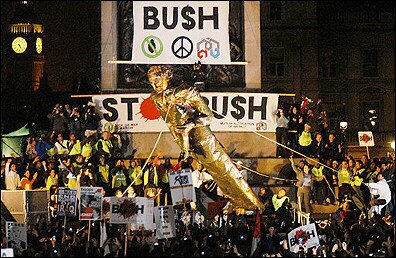Fri 21 Nov 2003

Protesters topple a statue of US President George W. Bush during a ‘STOP BUSH’ protest organized by the Stop the War coalition in central London(AFP/Eva-Lotta Jansson)
Herald-Sun (Australia) reports:
LONDON Tens of thousands of anti-war demonstrators, shadowed by thousands of police, yesterday marched through the heart of London to tell US President George W. Bush he is not welcome in Britain.
In a theatrical climax, they cheered the toppling of a statue of the President in the heartland of his staunchest ally.
Throngs of demonstrators pulled a flag over the head of the 8 metre effigy and heaved it down with ropes, in a symbolic echo of the destruction of Saddam’s statue in Baghdad.
Then protesters tore it to pieces and stamped the remnants, Iraqi style, into the flagstones of Trafalgar Square.
The estimated 110,000strong crowd was the biggest demonstration of the anti-war, anti-Bush brigade’s displeasure at the conflict in Iraq, carried out right under the nose of the visiting US leader.
Mr Bush and PM Tony Blair have vowed “not to flinch or give way or concede one inch” to terrorism in the wake of deadly bomb attacks on British targets in Turkey, but protesters said the close relationship between the two leaders made them deeply uneasy.
“We’re angry that Bush appears to be leading our country,” said marcher Ted Edwards earlier in the day. “Why Blair is allying himself to Bush I do not know.”
Many in the crowd said yesterday’s bombings in Istanbul, which killed at least 27 people, had strengthened their resolve to oppose US-British policy in Iraq.
“There have been more and more bombings since the action in Iraq and more terrorism,” said Mischa Gorris, a 37-year-old London lawyer. “You will never change the hearts and minds of terrorists by bombing them. This is what you will get.”
Mr Blair said he thought it was “bizarre” that people were protesting US-led efforts to topple the Taliban in Afghanistan and Saddam Hussein in Iraq, given how those regimes brutalised their own people.
He said the “effect of us not doing this would be that the Taliban was still in Afghanistan and Saddam was still in charge of Iraq. And I think people have got to accept that this is the consequence of the position they’re in.”
Earlier in the day, Mr Bush offered his condolences to the families of British servicemen killed in the Gulf War, including those whose loved ones died at the hands of Americans. Mr Bush’s spokesman would not say whether he had used yesterday’s private meeting to apologise over the friendly fire incidents.
Mr Bush later gave a return banquet for the Queen at the Regent Park residence of the US ambassador to Britain, William Farish.
The mood at the dinner, attended by senior US and British diplomats, royals, actors and VIPs, was sombre, compared to the lavish state dinner that the monarch offered Bush at Buckingham Palace the day before.
Mr Bush was to travel with Mr Blair tomorrow to the Prime Minister’s parliamentary constituency of Sedgefield, north-east England.
The two leaders were to have concentrated during their talks today on the way forward in Iraq, including prospects for a transfer of sovereignty next June to its post-Saddam Hussein governing council.
But at the Foreign Office press conference, Bush held out the possibility that US troop levels in Iraq could rise in the face of continuing deadly attacks on US, British and other occupation forces.
- AGENCIES